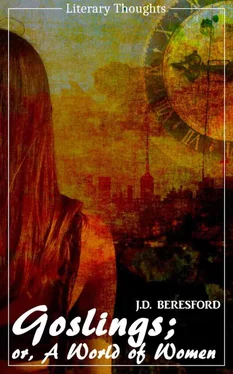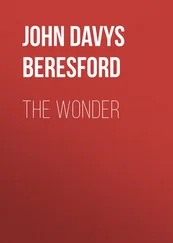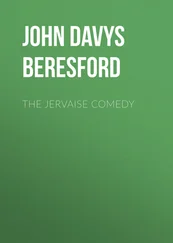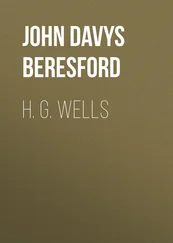Prince and Gosling exchanged a scared glance. Until that moment it had not come home to either of them that it was possible for English affairs to be affected by this strange and deadly disease.
The remainder of the conversation was complicated and exceedingly technical.
2
When he came back into the counting-house, Gosling looked unnaturally thoughtful.
“Anything gorne wrong?” asked his crony, Flack.
“There’s nothing wrong with the ’ouse, if that’s what you mean,” replied Gosling mysteriously.
“What then?” asked Flack.
“It’s this ’ere new plague,” returned Gosling.
“Tchah! That’s all my eye,” said Flack. He was a narrow-chested, high-shouldered man of sixty, with a thin grey beard, and he had a consistently incredulous mind.
Out here in the counting-house, Gosling’s thrill of fear was rapidly subsiding, and he had no intention of passing over his own important part in the house’s decision to buy for a rise; so he bulged out his cheeks, shook his head and said:
“Not by a long chalk it ain’t, Flack; not by a long chalk. There was that young feller, Thrale, as I was tellin’ you about; ’e gave me a hidea or two, and now s’mornin’ we ’ave this very serious news from Berlin.”
“Papers ’ave to make the worst of everything,” said Flack. “It’s their livin’.”
“Anyways,” continued Gosling, “I put it quite straight to the ’ouse this mornin’, as we might do worse under the circumstances than buy ’eavily....”
“You did?” asked Flack, and he cocked up his spectacles and looked at Gosling underneath them.
“I did,” replied Gosling.
“What did Mr Barker say to that?” asked Flack.
“He took my advice.”
“Lord’s sakes, you don’t tell me so?” said Flack, his spectacles on his forehead.
“I’m now about to dictate various letters to our ’ouse in Dundee,” replied Gosling, dropping his voice to a whisper, and assuming an air of mysterious importance, “advising them to send our Mr Stewart to Vienna immediate, from where ’e is to proceed to Berlin. ’E is, also, to ’ave private instructions from the ’ouse as to the extent of ‘is buyin’—which I may tell you in confidence, Flack, will be enormous—e-normous.” Gosling raised his head slowly on the first syllable, brought it down with a jerk on the second, and left the third largely to the imagination.
“But d’yer mean to tell me,” expostulated Flack, “as all this is on account of this plague? They been usin’ that as a blind, my boy.”
Gosling laid a bunch of swollen fingers on his colleague’s arm. “I tell you, Flack, old boy,” he said, “that this is serious. When Mr Barker took up my advice, as ’e did very quick, Mr Prince said, ‘You don’t tell me as you really take this plague serious, Barker?’ ’e said. And Mr Barker looked up and says, ‘I’m goin’ to put all my money on it.’” Gosling paused and then repeated, “Mr Barker says as ’e’s goin’ to put all our money on it, Flack.”
“Lord’s sakes!” said Flack. Here, indeed, was an argument strong enough to break down even his consistent incredulity. “But d’yer mean to tell me,” he persisted, “that Mr Barker thinks as it’ll come to England?”
“We-el, you know,” returned Gosling, “we need not, p’raps go quite so far as that. But it may go far enough to interfere with European markets, there may be trouble with quarantine, and such-like....”
“Ah, well, that,” said Flack with an air of relief. “Jus’ so, jus’ so. Mr Barker can see as far through a brick wall as most people, and so I’ve always said.” He dropped his spectacles on to his nose again, and returned to his interrupted accountancy.
Gosling went fussily into his own room and rang for his typist—a competent and presentable young woman, among whose duties that of turning her superior’s letters into equivalent English was not the lightest.
3
Gosling was very full of importance that day, and during lunch he wore the air of a man who had secret and valuable information. He was too well versed in City methods and too loyal to his own house to give any hint of Barker and Prince’s speculations in Austria and Germany; but when the subject of the new plague inevitably came into the conversation, he spoke with an authority that was heightened by the hint of reserve implicit in his every dictum.
When the latest joke on the subject, fresh from the Stock Exchange, had been retailed by one of the usual group of lunchers, and had been received with the guffaws it merited, Gosling suddenly screwed his face to an unaccustomed seriousness and said, “But it’s serious, you know, extremely serious.”
And by degrees, from this and many other better informed sources, the rumour ran through the City that the new plague was serious, extremely serious. That afternoon there was a slight drop of prices in certain industrial shares, and a slight rise in wheat and some other imported food stuffs; fluctuations which could not be attributed to ordinary causes. Mr Barker’s foresight was justified once again in the eyes of Gosling and Flack. Before five o’clock another letter was posted to Dundee, enforcing haste.
In the bosom of his family that evening, Gosling was a little pompous, and talked of economy. But his wife and daughters, although they assumed an air of interest, were quite convinced that the head of the house in Wisteria Grove was making the most of a rumour for his own purposes.
As Blanche said to Millie, later, father was always finding some excuse for keeping them short of dress money. That five pounds had proved inadequate to supply even their immediate necessities, and they were already meditating another attack.
“We simply must get another three pounds somehow,” said Millie. And Blanche quite agreed with her.
1
There was a lull for forty-eight hours after that announcement of the case of the new plague in Berlin, and Maxwell was beginning to regret his headlines when the news began to come in, this time in volume. The Russian censorship had broken down, and the news agencies were suddenly flooded with reports. There were several thousand cases of the plague in Eastern Russia; the north and south were affected, many men were dying in such towns as Kharkov and Rostov; there were a dozen cases in St Petersburg; there was a such a rush of reports that it was quite impossible to distinguish between those that were probably true and those that were certainly false.
The morning papers gave as much space as they could spare, and had even broken up some of the matter dealing with the arrangements for the opening of Parliament on that day. But the evening papers had news that put all previous reports in the shade. Eleven more cases were reported in Berlin, three in Hamburg, five in Prague and one in Vienna. But more important, more thrilling still, was the news that H.I.H. the Grand Duke Kirylo, the Tsar’s younger brother, had died of the plague in Moscow, and Professor Schlesinger in Berlin. Until that startling announcement came, the English public had incomprehensibly imagined that only peasants, Chinamen and people of the lower social grades were attacked by this strange new infection.
In the later editions it was reported on good authority that Professor Schlesinger had been observing a sample of the blood of the first case of plague that had been recognized in Berlin.
Nevertheless the majority of readers, after glancing through the obituary notices of H.I.H. the Grand Duke Kirylo and of the world-famed bacteriologist, turned to the account—only slightly abbreviated—of the opening of Parliament. And in many households the subject of the new plague gave place to the fiercely controversial topic of the English Church Disestablishment Bill, which had been indicated in the King’s Speech as a measure that was to be introduced in the forthcoming session. Many opponents of the Bill coupled the two chief items of news and said that the plague was a warning against infidelity. It may be assumed that they found sufficient warrant for the killing of a few thousand Russians, including a prince of the blood and a great German scientist, in the acknowledged importance of England among the nations. The death of half a million or so Chinamen in the first instance had been a delicate hint; now came the more urgent warning. Who knew but that if this sacrilegious Bill were passed, England herself might not be smitten. When warnings are disregarded, judgments follow. The Evangelicals found a weapon ready to their hands....
Читать дальше












